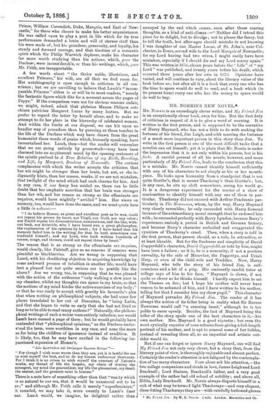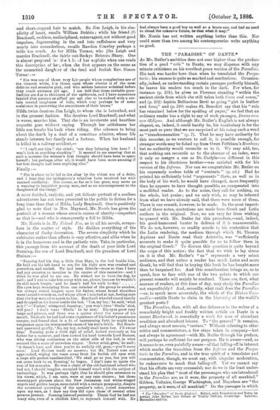MR. NORRIS'S NEW NOVEL.*
Ms.. NORRIS is an exceedingly clever writer, and My Friend Jim is an exceptionally clever book, even for him. But the first duty of criticism iu respect of it is to give a word of warning. It is written in the first person, and is supposed to be the narrative of Harry Maynard, who has not a little to do with making the fortunes of his friend, Jim Leigh, and with marring the fortunes of a much more important person in this story than Jim. To write in the first person is one of the most difficult tasks that a novelist can set himself; yet it is plain that Mr. Norris is under the impression that it is not only within his powers, but is his forte. A careful perusal of all his novels, however, and more particularly of My Friend Jim-, leads to the conclusion that this is a mistake. Mr. Norris cannot identify himself sufficiently with any of his characters to act simply as his or her mouth- piece. He looks upon humanity from a standpoint that is not quite Goethe's, that is nearer Thackeray's than Goethe's ; but, in any case, he sits up aloft somewhere, seeing his world go. It is a dangerous experiment for the master of a show of marionettes to identify himself with any one of them in par- ticular. Thackeray did not succeed with Arthur Pendennis par- ticularly in The Newcomes, whom, by the way, Harry Maynard very closely resembles ; he only succeeded with Harry Esmond because of the extraordinary moral strength that he endowed him with ; he succeeded perfectly with Barry Lyndon, because Barry's experiences embody a period in British and German history, and because Barry's character embodied and exaggerated the cynicism of Thackeray's creed. Then, when a story is told in the first person, that person should, as a rule, be attractive, or at least likeable. But for the freshness and simplicity of David Copperfield's character, David Copperfield, as told by him, might have been a failure ; as it is, he is a nonentity, if not a positive unreality, by the side of Micawber, the Peggottys, and Uriah Heep, or even of the child.wife and Traddles. Now, Harry Maynard, who tells the story of his friend Jim, is self- conscious and a bit of a prig. His eminently candid tutor at college says of him to his face, " Maynard is clever, if not quite so clever as he thinks himself. I hardly expect him to set the Thames on fire ; but I hope his mother will never have reason to be ashamed of him, and I have written to his mother, telling her that I consider him my show pupil." This character of Maynard pervades My Friend Jim. The reader of it has always the notion of its teller being in reality what Sir Barnes Newcome would call "a sneering beast," although ho is too polite to sneer openly. Besides, the fact of Maynard being the teller of the story spoils one of the best characters in it,—his own mother. Mrs. Maynard is a good vignette ; but even the most cynically superior of sons refrains from giving a full-length portrait of his mother, and is apt to conceal some of her foibles, instead of revealing them all, as an impartial and artistic out- sider would do.
But if one can forget or ignore Harry Maynard, one will find My Friend Jim not only very clever, but a story that, from the literary point of view, is thoroughly enjoyable and almost perfect. Certainly the reader's attention is not fatigued by the contempla- tion of too many characters. Four alone ask his attention,—the two college companions and rivals in love, James Leigh and Lord Bracknell ; Lord Staines, Bracknell's father, and a very good example of the rather bad old school of nobility ; and above all, Hilda, Lady Bracknell. Mr. Norris always disports himself in a suit of what may be termed light Thackerays—and very elegant, close-fitting Thackerays they are—with carefully buttoned gloves
• My Friend Jim. By W. B. Norris. 2 TOIL London : Macmillan and Co.
and short-cropped hair to match. So Jim Leigh, in his sim- plicity of heart, recalls William Dobbin ; while his friend (?) Bracknell, reckless, undisciplined, extravagant, not without good impulses, degenerating in the end into raffishness and very nearly into scoundrelism, recalls Rawdon Crawley perhaps a trifle too much. As for Hilda Turner, who jilts Leigh and marries Bracknell, she fairly out-Beckys Rebecca Sharp. One is almost prepired fo: tl a t.13 cf her exploits when one reads this description of he-, when she first appears on the scene as the unmarried daughter of the fond and foolish Rev. Simon Turner :—
" She was one of those very fair people whose complexions are of the clearest white, tle bloom upon whose cheeks is of the most delicate and sensitive pink, and who seldom become wrinkled before they reach extreme old age. I am told that these enviable pecu- liarities are due to thickness of the epidermis, and I have sometimes fanoied that persons so gifted are apt also to be endued with a cer- tain mental toughness of hide, which may perhaps be of some assistance in preserving the smoothness of their brows."
Hilda twice deceives Jim Leigh, to whom she is betrothed, and in the grossest fashion. She deceives Lord Bracknell, and what is worse, marries him. That she is an inveterate and heartless coquette goes without saying. Through her selfishness her little son breaks his back when riding. She schemes to bring about the death by a duel of a sometime admirer, whose life stands between her family and a fortune. When her husband is killed in a railway accident,—
" ' I can't see him !' she cried ; are they bringing him here ? I won't look at anything shocking !' It seemed to me amazing that at such a moment the woman's first thought should have been to spare herself ; but perhaps, after all, it would have been more amazing if her first thought had been anything else."
Finally :— " She is about to be led to the altar by the eldest sou of a duke, and I hear that the bridegroom's relatives have received her with marked cordiality. Her career, so far as it has gone, may serve as a warning to impulsive young men, and as an encouragement to the daughters of the clergy."
A more finished, realistic, and yet delicate portrait of a soulless adventuress has not been presented to the public in fiction for a long time than that of Hilda, Lady Bracknell. One is positively glad to note that in Mrs. Maynard, Mr. Norris has given the portrait of a woman whose error is excess of charity—imperfect as that is—and who is consequently a foil to Hilda.
Mr. Norris is in My F; lend Jim, as in all his novels, scrupu- lous in the matter of style. He dislikes everything of the character of flashy decoration. The severe simplicity which he cultivates rather than affects is very effective, and alike when he is in the humorous and in the pathetic vein. Take, in particular, this passage from his account of the death of poor little Lord Sunning, the son of Lord Bracknell, and the grandson of Lord Staines :—
" Sunning had his dog, a little blue Skye, in the bed beside him. He held out his left hand to me, for his right arm was crashed and powerless, and smiled. We had been friends—more so than I have had any occasion to mention in the course of this narrative—and I think he was glad to see me. He wished me to have the dog, he said ; and I was to take him away with me, please, because he wouldn't lie still much longer, and he hasn't had his walk to-day.' His eyes kept wandering from one member of the group to another, but always rested longest upon his father, whose broad shoulders were turned towards us, and whose elbow I touched at last, feeling sure that the boy wanted to speak to him. Bracknell wheeled round hastily and dropped on his knees beside the bed. ' Yes, my boy,' he said, what is it ?'—'Father,' whispered Sunning ; you won't have' Sheila' shot, will you ? I don't want Sheila' to be shot.' His eyes grew very large and piteous, and there was a quiver about the corner of his mouth. No doubt he had bad some experience of his father's passionate temper, and feared that in a fit of unreasoning fury, ho might take vengeance upon the irresponsible cause of his son's death. But Brack- nell answered.grufily, 'No, my boy, nobody shall harm her. I'll swear that.' Sunning gave a little sigh of relief, looked curiously at his father for a moment, and then turned his head towards Lord Staines, who was sitting motionless on the other side of the bed, in what seemed like a state of nerveless stupor. Never mind, gran,' he said ; it doesn't hurt, and then you're so awfully old, gran,—you'll come soon.' Lord Staines made no answer; but Mr. Turner rose and approached, wiping the tears away from his foolish old eyes with a large silk pocket-handkerchief, ' We shall go to yen, bat you will not (some back to us, Sunning,' be began. I don't care to quote the rest of his remarks. He was a cleric of the old-fashioned school who had not, I should imagine, occupied himself mach with the subject of eschatology. It was perhaps right that he should give utterance to his views, which, I am sure, were at any rate sincere ; but those stereotyped phrases about the New Jerusalem and white-winged angels and golden harps, enunciated with a certain pomposity, despite the occasional quavering of the speaker's voice, jarred somewhat upon my ears, as I dare say they did upon those of several other persons present. Sunning listened patiently. Thank God he had not many sins, even of a childish kind, to reproach himself with. He had always been a gcod boy as well as a brave one, and had no need to dread the unknown future, be that what it may."
Mr. Norris has not written anything better than this. Nor could more than two among his contemporaries write anything so good.



































 Previous page
Previous page